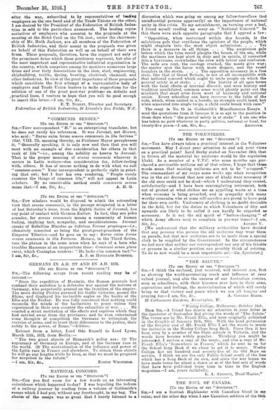ITo THE EDITOR or THE " SP-CTATOR.") Sin,—Few scholars would
be disposed to admit the astounding view that sensus communis, in the passage misquoted in a letter of last Saturday's issue, from the Eighth Satire of Juvenal, has any point of contact with German Kultur. In fact, they are poles asunder, for sensus communis means a community of human feeling, implying tact, sympathy, and considerateness. Juvenal speaks of Rubellius Blandus as inflatum Nerone propinquo—i.e., offensively conceited as being the great-great-grandson of the Emperor Tiberius—and he goes on to say: Barus enim ferme sensus communis in ilia Fortuna. Horace, in the Third Satire, 'uses the phrase in the same sense when he says of a bore who troubles Maecenas at an inopportune time: Communi sensu plane caret, which Conington renders: " He lacks e'en common tact"—


































 Previous page
Previous page